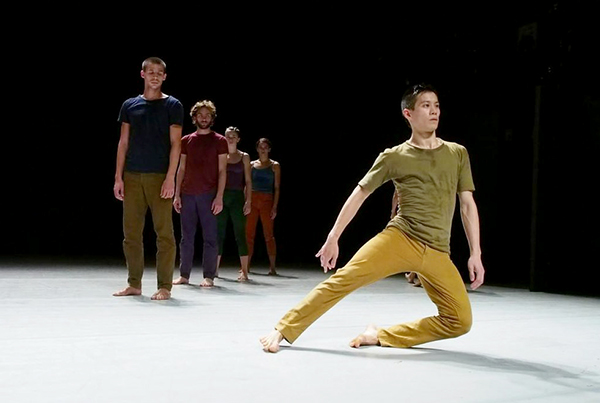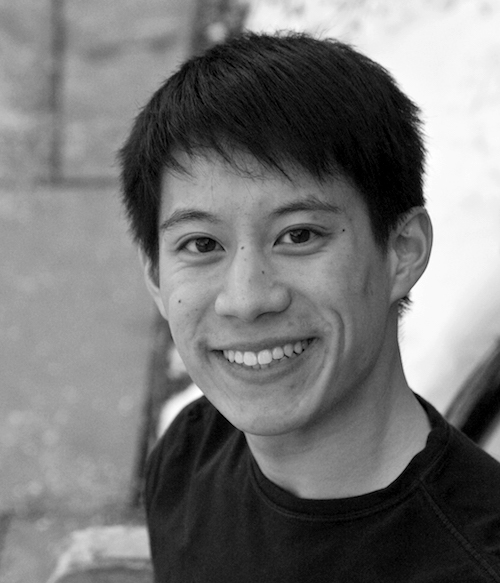Exploring the Identity of Professional Dancer
KELVIN VU is a freelance dancer in Tel Aviv and former dancer in the Batsheva Youth Ensemble. With experience both dancing in a full-time company and doing project-based work, he has a wide lens on what professionalism in dance can be. His responses are part of a larger series dissecting what it means to be a professional dancer. To read other perspectives on the topic, click here.
Kelvin Vu in Ohad Naharin’s Project Secus (2014)
Photo by Gadi Dagon, courtesy of Batsheva Dance Company
~~
What does your current regular dance practice look like?
My current dance practice includes daily training in Ohad Naharin’s Gaga movement language before rehearsals. Since I work as a freelance dancer for a few different choreographers, my rehearsal schedule constantly changes. Some weeks are very heavy and some weeks light, but taking class every day is the cornerstone of my ongoing research. In the future, I’d like to include more ballet classes as a consistent part of my practice, and workshops in other movement languages for variety. I also teach Gaga and create my own work, both more recent additions to my practice.
Would you call yourself a professional dancer?
Yes, I am a professional dancer.
What do you believe is necessary for a dancer to call themselves professional? Is part of being a professional getting paid?
As long as a dancer identifies as a professional, then he/she can call him/herself one, regardless of talent, success or income. Self-identification is key. He/she can be terrible and broke, but still be a self-proclaimed professional.
I wish, though, that every professional dancer could make a living wage.
Is there a certain amount of training involved in becoming a professional dancer?
I believe that ongoing training is necessary for a healthy and sustainable career, that it’s important not only for becoming a professional dancer but also in continuing to be one. Like other artists, a dancer’s range and richness of expression depends on a set of well-stocked and well-maintained tools. Developing this toolbox requires consistent and continued training, as does a dancer’s longevity, growth, and physical health.
Do you consider project-based work to be professional?
As a freelance dancer, of course I consider project-based work to be professional! Almost all professional dancers are or have been involved in projects of some kind, though in different capacities and with different commitments.
Freelance work is a pillar of the dance profession. Most choreographers, at least here in Tel Aviv, work from project to project, which means that the dancers they hire also work in the same way. A few dancers and choreographers work exclusively for full-time companies, though there is a lot of crossover between company and freelance work.
Even though it’s often more difficult and less stable, working from project to project has its advantages. As a freelance dancer, I feel that I can take more risks and enjoy a wider range of work. I just wish that there were more protections and higher wages.
Do you consider solo work to be professional?
Not only do I think that solo work is professional, but I really admire anyone who chooses it. It’s hard to go it alone, and you really need to be driven and disciplined to make a solo body of work.
I think that the freelance work has been an important part of the dance profession for a long time, and that there are fewer and fewer clear divisions between company, project-based, and solo work.
Do you think the definition of a professional dancer is different than it was 25 or 50 years ago? If so, do you have any ideas why it might have changed?
Since I haven’t been a professional dancer for much time, I’m not sure how to compare my experience to those of professionals 25-50 years ago. Generally though, I think that since the “gig economy” has picked up in popularity and recognition, more people accept freelance dance work as legitimate. That, combined with crowdfunding, has made more permutations of work possible for professional dancers.
Are there instances when people apply the term “professional” to a dancer or group of dancers when you feel it shouldn’t be applied?
I haven’t felt that yet.
Vice versa, are there instances when people don’t apply the term “professional” to a dancer or group of dancers when you feel it should be applied?
I also haven’t felt that yet either. I do feel that people often use the terms “professional” and “amateur” to comment on the quality of a dancer or piece, but I would rather people use more specific and useful terms.
How might your cultural perspective – where you live, where you’re from, what form of dance you practice – influence what you think of as professional?
I think that culture often defines what people think of as legitimate or possible professions. In a country like Germany, where there is state support of the arts, state theaters, and even unemployment compensation for freelance dancers, it’s much more realistic to imagine making a living as a professional dancer. In places that offer fewer resources, venues, and support for professional artists, it is much harder. Therefore, what it means to be a professional dancer–in schedule, form, etc.–depends on location and era. A certain cultural perspective or place may delimit professional definitions, though professional artists often do their work in spite of cultural and popular limitations.
What do you wish people wouldn’t assume about the dance profession?
I wish people wouldn’t assume anything about the dance profession!
~~
Kelvin Vu is a freelance dancer and teacher based in Tel Aviv, Israel. He grew up near Boston, Massachusetts, and attended Yale University, where he received his BA in environmental studies. From 2011-2013, he trained at the San Francisco Conservatory of Dance under the direction of Summer Lee Rhatigan. He then moved to Tel Aviv to join Batsheva the Young Ensemble where he danced for three years under the artistic direction of Ohad Naharin, and performed the repertory of Naharin, Hofesh Shechter and Sharon Eyal. Since leaving the company, Kelvin has worked with Noa Zuk and Ohad Fishof, Roy Assaf, and Dafi Altabeb. In 2017, Kelvin rejoined Batsheva as Ohad Naharin’s assistant and assistant rehearsal director for both the main company and young ensemble.


